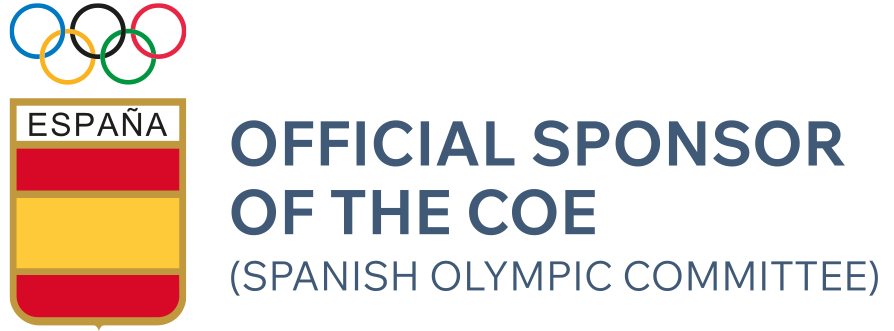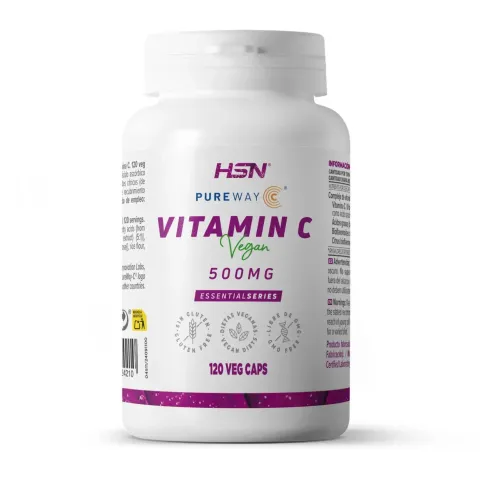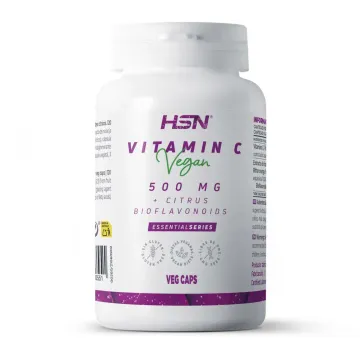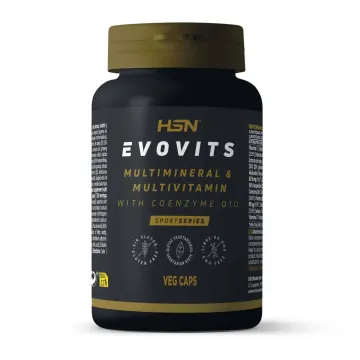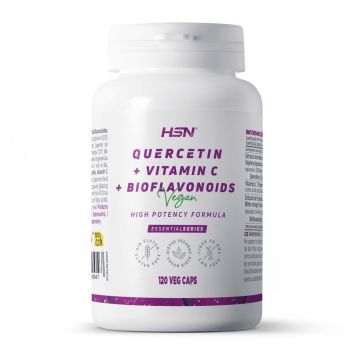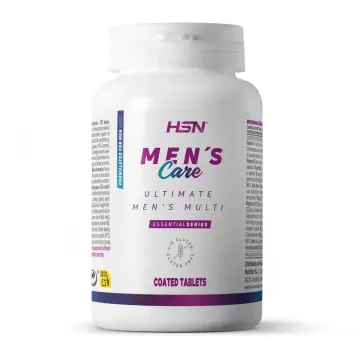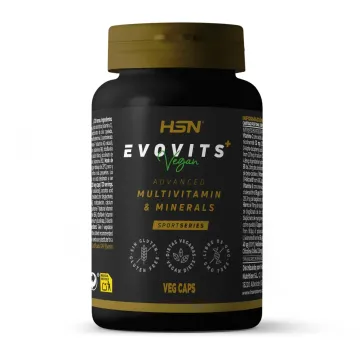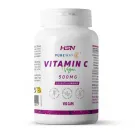- 500mg of vitamin C protected by the patented PureWay-C® system.
- Vitamin C in the form of a registered complex of Ascorbic Acid + Plant-based Fatty Acids + Citrus Bioflavonoids.
- 12 times more efficient | 12% greater antioxidant power | 233% better retention in the body compared to other ascorbates.
- The best way to complement your diet with concentrated, isolated sources of vitamin C.
- 100% vegan product – Contains no animal ingredients. Suitable for all diets. Allergen-free.
PureWay-C® Vitamin C: Your Best Choice
Vitamin C 500mg (PureWay-C®) from EssentialSeries is a dietary supplement made from a complex based on vitamin C, registered under the PureWay-C® patent, and contains ascorbic acid as a form of vitamin C, plant-based fatty acids, and citrus bioflavonoids in its composition.
The role of bioflavonoids and fatty acids, as explained by the company responsible for developing this innovative ingredient, is to blend with the vitamin C to act as a natural barrier against oxidative degradation within the human body, which makes PureWay-C® the best choice of raw material for vitamin C.
Vitamin C is one of the most globally recognised antioxidant compounds, with a long history of use, as it is also an essential nutrient for human health.
Discover the best option HSN has to offer
Patent: PureWay-C, the ideal form of Vitamin C
The company behind the prestigious PureWay-C® patent is called One Innovations Labs, a company driven by the values of:
- Science as a standard.
- Efficacy you can trust.
- Motivation to create better products for everyone.
With these clear goals, they developed PureWay-C®, currently recognised as one of the best forms of administering vitamin C as a dietary supplement. As the developers themselves indicate on their website:
- It has a 233% higher retention in the human body.
- It is 12 times more efficient.
- It has a 12% greater antioxidant power.

This makes it one of the best options available.
'Complex' Vitamin C, much more than pure vitamin
Ascorbic acid is the classic form of vitamin C.
While there are other alternative forms, such as ascorbates, which offer benefits such as being non-acidic presentations of vitamin C, PureWay-C® is the world reference.
PureWay-C® is a vitamin C complex.
The system through which PureWay-C became the most internationally recognised patent is, as One Innovations Labs explains:
'To improve vitamin C absorption, PureWay-C® does something unique: it utilises a patented fatty acid complex that blends in fat mediums. Fatty acids are substances easily recognised by our cells, allowing more vitamin C to be absorbed in the body.'
Additionally:
'Once inside the body, vitamin C faces another absorption threat: degradation due to oxidation. To maintain its essential nutrients intact, PureWay-C® is made with citrus bioflavonoids, which also boost its efficacy.'
With a unique protection system developed from plant-based ingredients
The fatty acids and bioflavonoids contained in the patented 'PureWay-C®' vitamin C complex protect the vitamin C within a 'shield system', as defined by its developers, allowing for much greater bioavailability, with improved efficacy thanks to maintaining its integrity in a simpler and more durable way, both during storage and during absorption and metabolism.
Vegan Vitamin C - Its complex contains no animal ingredients
Vitamin C options are suitable for vegan diets, whether they are synthetic or derived from fermented plant sources; however, there are considerations to bear in mind.
It is most common that when fatty acids are used as part of a protection system, as is would be the case here, they come from animal sources because the industry is more accustomed to working with these sources, and their use is cheaper.
However, the use of animal-based fatty acids, aside from the ethical implications it may have, makes a product like vitamin C, which is naturally suitable for vegan diets and that many strict vegetarians could use to complement their diet, an option no longer suitable for vegans.
Why would we want that? Part of HSN's vision is to bring healthy eating to everyone, regardless of their dietary preferences or needs; that’s why we always work with vegan-friendly raw materials and allergen-free products whenever possible. This is also why we have chosen the PureWay-C® patent, as its fatty acids are plant-based from rice, not animal-based.
Likewise, the coating agent we use for our capsules is hypromellose, not gelatin, because we prefer to use plant-based options rather than animal-based ones, ensuring compatibility with all dietary preferences.
Vitamin C is packed with benefits for you
Did you know...?
Vitamin C is one of the most commonly used dietary supplements to boost immune health. It is widely used in winter, during seasonal changes, or among athletes exposed to adverse environmental conditions. This is mainly because vitamin C contributes to the normal functioning of the immune system during and after intense physical exercise1.
Additionally, among non-athletes, vitamin C contributes to the normal functioning of the immune system.
On the other hand, vitamin C is one of the most historically recognised antioxidants that contributes to the protection of cells against oxidative damage and acts as a recycler of other antioxidants in the body, as it helps to regenerate the reduced form of vitamin E.
Do you know when the importance of vitamin C was discovered?
The essential nature of vitamin C was discovered in the context of sailors suffering from scurvy, a disease that affected sailors on long sea voyages, especially during the 16th and 17th centuries. Although the symptoms of scurvy and the connection to diet were known since ancient times, the exact cause was not understood for many centuries. It was known that sailors who spent months at sea without access to fresh food were especially vulnerable, but the nutrient that prevented the disease had not been identified.
The turning point came in 1747 when Scottish doctor James Lind conducted an experiment aboard the HMS Salisbury. Lind selected twelve sailors with scurvy and divided them into six groups, administering different remedies he believed could help. He discovered that those who received citrus fruits, such as lemons and oranges, recovered quickly. However, his findings were not systematically applied until decades later. Despite his success, the British Navy did not officially implement the regular supply of lemon juice on ships until 1795, significantly reducing the incidence of scurvy.
The discovery of vitamin C itself occurred in the 20th century, when Hungarian chemist Albert Szent-Györgyi first isolated ascorbic acid in 1928, and in 1932 it was confirmed to be the substance responsible for preventing scurvy. This discovery allowed an understanding of why citrus fruits and other fresh foods were effective against the deficiency disease. Thus, vitamin C was recognised as an essential nutrient for human health, with high antioxidant power and contributing to the normal formation of collagen for the normal functioning of various structures.
I have to decide which vitamin C to buy. Which one should I choose?
To start, vitamin C, in its basic form as ascorbic acid, has good oral bioavailability, so standard vitamin C like the kind you can find in:
It is effective.
There is an alternative to this acidic presentation, which is the ascorbates, providing much milder options with adjusted pH, a formulation many people seek to avoid acidic nutrients, for example, to protect enamel. Options include:
PureWay-C® is a protected vitamin C with greater bioavailability, making it a superior option for equivalent doses compared to standard ascorbic acid, and it is now the best option for those with limited intake of fresh foods, fruits, and vegetables, and therefore, potentially reduced vitamin C intake.
References
- Doseděl, M., Jirkovský, E., Macáková, K., Krčmová, L. K., Javorská, L., Pourová, J., … Mladěnka, P. (2021). Vitamin c—sources, physiological role, kinetics, deficiency, use, toxicity, and determination. Nutrients, 13(2), 1–36.
- Chambial, S., Dwivedi, S., Shukla, K. K., John, P. J., & Sharma, P. (2013). Vitamin C in disease prevention and cure: An overview. Indian Journal of Clinical Biochemistry, 28(4), 314–328.
- Pancorbo, D., Vazquez, C., & Fletcher, M. A. (2008). Vitamin C-lipid metabolites: Uptake and retention and effect on plasma C-reactive protein and oxidized LDL levels in healthy volunteers. Medical Science Monitor, 14(11), CR547-51.
- Weeks, B. S., & Perez, P. P. (2007). Absorption rates and free radical scavenging values of vitamin C-lipid metabolites in human lymphoblastic cells. Medical Science Monitor, 13(10), BR205-10.
1 The beneficial effect is obtained with a daily intake of 200 mg added to the recommended daily intake of vitamin C.
 Before
Before After
After During
During Morning
Morning Afternoon
Afternoon Night
Night


